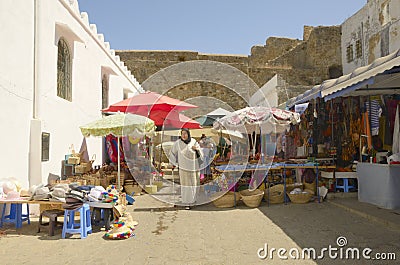
Asilah city..Morocco holidaysin
Asilah city is famous for its long sandy beaches. Whether it is one that is close to the city center, or of Rmilat, 4 km from the city.
Walks on the ledge at the edge of the sea remains very popular and restaurants offering quality fish abound. Today, sports activities and develop a new marina will soon be ready to receive yachts worldwide. It is already possible to fishing. Similarly, the vast expanse of beach is perfect for enjoying long walks, horse or camel.
Asilah Morocco, this small trading town, over 3,600 years old, is situated on the northwest tip of Morocco. Until 1978 the town was deteriorating behind the ancient defensive walls that still enclose it. That situation was soon changed by the ideas of one man, Mohammed Benaissa, by his belief in culture as an invaluable resource and his dreams for his hometown. Through the efforts of Benaissa and his colleague, another local resident, Mohammed Melehi.

The annual cultural festival of Asilah was created to fund the rehabilitation of the town, an effort continuing today. The rehabilitation project is heavily intertwined with the creation of the festival and the story of the two men. In 1989 the town won an Aga Khan Award for its rehabilitation efforts. Asilah has been granted a whole new life but raises issues related to the continuing development of the town and its inhabitants.
 Asilah is located 42 km southeast of the town of Tangier on the Atlantic coast. The town is completely surrounded by Portuguese defensive walls that were erected in the 15th century. (Images 1 & 2) There are extensive beaches and a natural harbor on the northwest side of the town. Farmlands surround the town and there are no factories in the immediate area., to the north of Asilah beach resorts and to the southeast lie squatter settlements called mixik. This northern Atlantic coastal area falls into the Mediterranean climate zone bringing mild wet winters and dry warm summers. The presence of the Atlantic creates more rainfall than in the other Mediterranean areas.
Asilah is located 42 km southeast of the town of Tangier on the Atlantic coast. The town is completely surrounded by Portuguese defensive walls that were erected in the 15th century. (Images 1 & 2) There are extensive beaches and a natural harbor on the northwest side of the town. Farmlands surround the town and there are no factories in the immediate area., to the north of Asilah beach resorts and to the southeast lie squatter settlements called mixik. This northern Atlantic coastal area falls into the Mediterranean climate zone bringing mild wet winters and dry warm summers. The presence of the Atlantic creates more rainfall than in the other Mediterranean areas.
Asilah's history stretches back to around 1500 BC, since then it has changed hands several times. The significance and morphology of the town is linked to its natural harbor. The Phoenicians called it Silis or Zilis and used the town mainly as a trading post. Being at a favorable location at the crossroads between the East and West, it was later occupied by the Carthaginians, Byzantines, and the Romans. In the 9th century it was occupied by the Arabs and the Normans.

In 1471, Asilah was occupied by the Portuguese who built the town's fortifications. It was voluntarily returned to Morocco in 1550, but was absorbed by the Spanish as they took control of Portugal in the late 16th century. In 1692 the town was recaptured by the Moroccans under the leadership of Moulay Ismail. In the 19th and 20th centuries Asilah was a base for piracy. In 1911 Spain took the northern portion of Morocco as their protectorate which included Asilah. The country finally gained its independence in 1956.

No comments:
Post a Comment